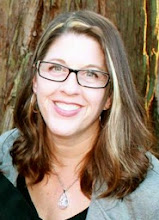 |
| My own young writer, a few years ago... |
During the school year, I help out at a book club for 9th graders at my high school. Many of them are aspiring writers and I get a lot of questions about publishing a book as soon as possible. I love their enthusiasm and my first reaction is: great! And then my second reaction is: wait.
I got another email today from someone who knows a 14 year-old who is a great writer and wants to know if any publishers would be interested in publishing her stories, so I figured I'd write down my thoughts about young writers and publication.
I always want to encourage young writers to keep going - keep writing anything that pops into their heads. Write stories, write poems, write screenplays. One of my biggest regrets is that while I liked to read and my teachers always said I was a good writer, I didn't start writing stories until I was in my late thirties. If I'd listened and started when I was younger, I would have that much more time to write that many more books. I love it when teenagers are passionate about what they're doing and I never want to do anything to discourage that. But I don't think that most young teenagers are ready for publication.
One problem is their lack of experience. I had a 9th grader ask me recently how to write a love scene when she's never even kissed a boy. My answer was to wait until she'd had some of these experiences. While you can leave a lot of things in a manuscript to the imagination, in a many of cases, there's no substitution for experience - and that's something that you just can't rush.
No matter how amazing your first novel is, given a few years and some more experience writing and you'll probably see all of the flaws. If you ask most any writer, the first novel they published wasn't the first novel they wrote (and if it was, we don't hang out with them). We all have what we call 'drawer novels' - books that were written to be put in a drawer. Just because a story isn't meant to be published doesn't mean they don't have a purpose. Each and every story you write teaches you so much about story and characterization - things that have to be practiced to be improved, and you never know where a story will lead. We just sold a thriller called THE THIRD TWIN to Delacorte that was a total rewrite of a story that I'd first written years ago. One of the biggest problems with self-publishing is that any writer can finish their first novel and post it online in a matter of hours - and once it's there, it never truly disappears. A cringe-worthy thought for most of us.
I often hear about a teenager who is an exceptional writer - full of passion and maturity beyond his or her years. I remember helping out at a writing workshop and reading some paragraphs from a young writer that were just amazing and I knew that she had a long career ahead of her. No matter how mature the writing, most teenagers (heck, most adults) can't handle the emotional roller coaster that is the world of publishing. Even the best book out there is subject to criticism and rejection - from agents, from editors and from the reading public. Every time you turn around, there is someone out there saying you suck. It can be difficult for even the most seasoned veteran to keep going in the face of all the negativity that gets flung at them and I can't imagine a young person coming out of the experience unscathed.
If you are (or know) a young writer, my best advice is to stop thinking about publication and start thinking about perfecting your craft. Read everything you can get your hands on. Don't like sci-fi? Go ask your librarian for her favorite sci-fi novels and spend a few days reading them. Write as much and as often as possible. Seek out creative writing classes - many libraries offer workshops for young writers. Join a writing group, either online or in person. There are different groups for different kinds of writing - if you're interested in writing for children or YA, SCBWI and VerlaKay's message boards are two of the best. Find other writers who know what they're doing to critique your work and give you pointers. Go to conferences and book signings to meet people who are doing what you want to do.
Most of all don't be in such a hurry and don't give up. When you're ready to be published, the world will be waiting.










2 comments:
E- Resources have to a large extent ease management and access to information materials. With the raise or information explosion occasion by the advent of the printing press. ICT has come to the rescue of information handlers. To this end, I advocate the intensification of research into other ways of utilization of these facilities. For details contact; University of Nigeria, Nsukka website or http://www.unn.edu.ng
Commndo17379. UNN.
I agree with a lot of points that you specified right here. There is a great deal to be learned from articles as informative as this. Excellent job!
Post a Comment